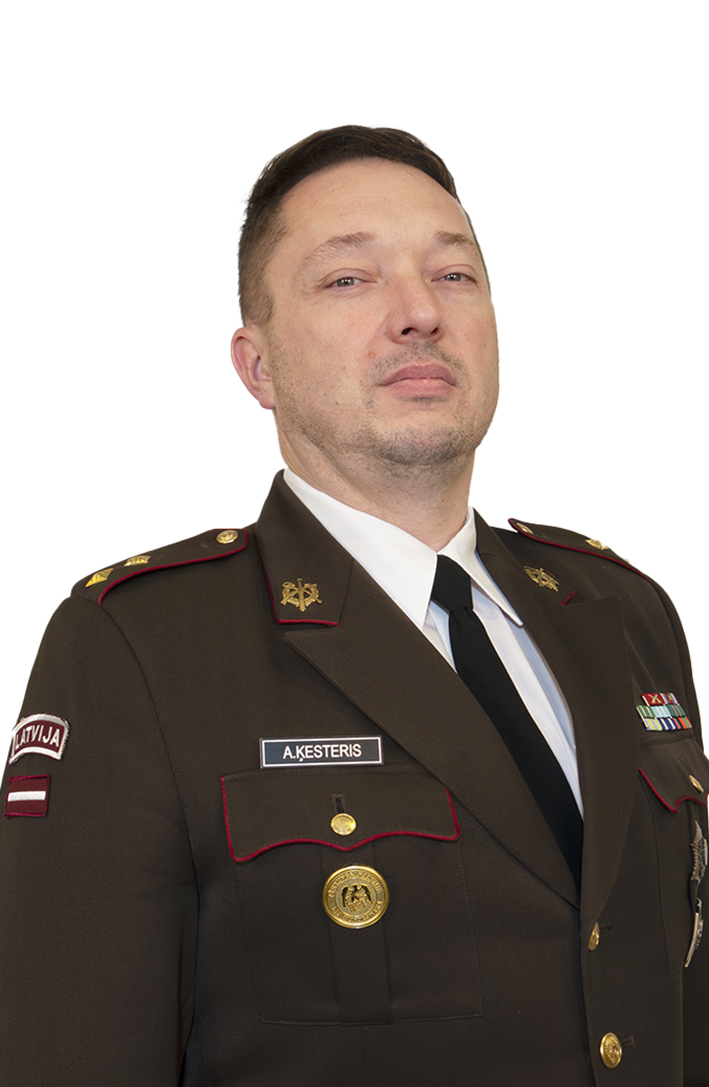| Degree Command Staff Officer |
| Diploma First cycle professional higher education diploma |
| Qualification Lieutenant |
| Accreditation The field of study is accredited until November 14, 2030 (Law on Higher Education Institutions |
| Tuition fee State-paid studies |
| Duration 1 year and 5 months |
| Language Latvian |
| Credit points 101 |
| Type Full-time intramural studies |
| Requirements Undergraduate or higher education |

If you already have a higher education at one of the universities and want to develop your career in a dynamic environment, then during the one-and-a-half year of studies you will receive the degree of Command Staff Officer in order to get a guaranteed job in the military field.
The aim of the study programme: to prepare students as mid-level managers for service in the National Armed Forces (NAF), the North Atlantic Treaty Organization and the European Union multinational units with pronounced leadership abilities, high motivation and professional competence.
Learning outcomes: to be able to manage personnel, to control the work of subordinate structural units, to be able to take responsibility for the decisions taken and their consequences; to act ethically, legally and to understand the responsibility for the impact of professional activity on the environment and society, ensuring cooperation with state, foreign and local government institutions, legal and natural persons within their competences; be able to use the knowledge acquired in business management and personnel psychology in accordance with the objectives, following the progress of their implementation, making decisions and carrying out corrective actions for optimization.
Admission
Test of the level of knowledge: test in English to determine the level of proficiency in this subject.
To apply for studies at the National Defense Academy of Latvia (NDAL), there are the following admission criteria:
• a citizen of the Republic of Latvia,
• age from 18 to 35 years,
• a higher education,
• knowledge of the national language (C1),
• no criminal conviction,
• good health and physical fitness.
Pre-study phase
Before imatriculation (enrolment in the list of university students) in the first cycle professional higher education study programme, you must complete a pre-study course — Cadet Candidate Course, which consists of:
• Basic Military Training Course (Level 1 and 2) at the NAF Infantry School from September to December (13 weeks);
• Junior Leader Course from January to February (6 weeks).
Content of the study programme
FIRST YEAR OF STUDIES
In the first year of studies, you will undergo the second most intensive military training of officers in Latvia after the training of officers of the NAF Special Task Unit. Initially, you will acquire knowledge and skills necessary for the junior leader and the commander of an infantry squad. After that, you will improve your knowledge of the structure and capabilities of small arms, combat techniques and weaponry, get acquainted with the subjects related to combat sustainment and combat support. Then the examination of the acquired knowledge of military leadership, physical and psychological abilities, perseverance and suitability for the profession of an officer in the Combat Endurance Course will follow. At the end of the academic year, you will learn to plan and practically lead infantry platoon command operations.
SECOND YEAR OF STUDIES
In the second year of studies, you will acquire the necessary knowledge of military leadership, psychology, pedagogy and military law for the junior leader. The necessary knowledge will be supplemented by the subjects of the history of civil defense and martial arts. At the end of your studies, you will gain an internship in NAF units and conduct research, as well as certify that you have obtained the necessary qualifications by writing and defending your thesis.
The content of the study programme may be updated and changed during the course of studies.
Courses
In the course of studies, the following subjects will be mastered:
• Construction and Capabilities of Combat Equipment and Armament;
• Construction and Capabilities of Small Arms,
• Chemical, Biological, Radiological and Nuclear (CBRN) Defense,
• Communication,
• Sustainment of Land Forces
• Fire Support and others.
Study programme objectives
1. To ensure the acquisition of knowledge and skills necessary in the field of military leadership.
2. To develop in students the ability to make decisions, solve problems and lead the personnel of the subordinate subunit in various and constantly changing or uncertain conditions, in peacetime and in the event of national danger, including in extreme and dangerous environments, contributing to the comprehensive development of the personality.
3. To prepare competent, internationally competitive military leaders of various levels, who are able to use their knowledge, acquired skills and demonstrate understanding and professionalism.
Requirements for obtaining the qualification: the programme concludes with the State (qualification) examination - qualification paper (diploma thesis).
Opportunities to continue your studies
Opportunities for further education in academic or professional master's degree programmes, fulfilling the relevant admission requirements for the master's programme.
Teaching staff and location of studies
Director of the study programme
 |
Lieutenant Colonel |
National Defense Academy of Latvia
Military methodologist of the Department of the Study and Methodological Support
 |
Katrīna Bekere |
Teaching staff
 |
Dr. hist. Lieutenant |
 |
Lieutenant Tomass Delvers |
Study base: National Defense Academy of Latvia
ALUMNI
 |
Lieutenant |
From my own experience, I can say that I enlisted in the army and decided to study in parallel to get a higher education. After graduation, I was already in service and realized that I wanted to improve and develop further, so I continued on this path and got a military qualification. In my opinion, studying at the National Academy of Defense not only contributes to the growth of each of us intellectually, physically and psychologically, but also contributes to our personal and national self-confidence.